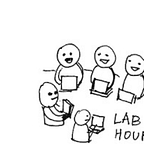Human Fax Machine & Teaching Binary
Zach and Galen had us start off the week with an exercise called Human Fax Machine. The goal was to split your team into two groups separated by a divider and come up with a non-linguistic system to communicate drawing instructions from one group, which had an original drawing, to the other, which had to replicate that drawing. The exercise boiled down a fundamental problem of computing: how to prepare “detailed instructions for an automaton — a machine that obeys unerringly the commands given to it, and for which every possible outcome has to be anticipated by the programmer” (source).
The exercise brought up questions that we plan on grappling with, like “Should we prioritize human readability, or brevity?” and “Should we stick to scalable solutions even when doing so would feel like overkill for simple problems?”
We also broke off into groups to come up with our own teaching tools for how to translate between base-ten and binary counting systems. Our approaches ranged from helping a binary-speaking extraterrestrial visitor communicate with a human, to marking years on a birthday cake with candles lit in binary.
Read about the students of Spring 2019 here.
SFPC Salon
On Thursday, we had the first public event of our session: the SFPC Salon. The four guest presenters covered topics ranging from data and machine learning ethics to adaptive design and paper engineering.
Janus Rose gave a presentation about how susceptible machine learning and automation are to the oppression of marginalized groups. She introduced the concept of psychological malware: exploits of humans’ increasing machine-readability, as well as large-scale social engineering projects that run on big data and machine learning.
Kelli Anderson showcased her work as a paper engineer and graphic designer, focusing on her innovative analog and lo-fi projects like This Book is a Camera and a paper record player. She discussed the challenges (and joys!) of working under self-imposed material constraints.
Surya Mattu highlighted his Pulitzer Prize-finalist work Machine Bias, which examines how algorithms written by biased people end up reflecting those same biases themselves. Surya also described his work with Data & Society, which included investigations about how our wireless devices leak data and why this matters. He gave a spooky demo of the packet-sniffing tool Herbivore.
Amit Pitaru presented his work with Hello Morse, a project from Experiments with Google. Bringing Morse code to Gboard has an exciting and much-needed application: increased accessibility for people with unique usage needs. Amit discussed “cardboard” design: making technology highly adaptable on an individual, one-off level.
Orientation & Meet the TAs
Lauren showed us around Westbeth and gave us insider tips about how the entire place works. It was fascinating to see SFPC’s space situated in a historical context. The building complex was originally built for Western Electric in 1868, but was later occupied by Bell Laboratories, which hosted key figures in computing like Alan Turing and Claude Shannon. This documentary gives a glimpse into the lives of our neighbors at Westbeth, which has been an innovative housing and workspace hub for artists since the 60s. Our post on Code Societies includes a more detailed history of the space.
Lauren also led a goal-setting workshop based on the goal-setting practices of the eccentric Zig Ziglar.
This week was as much an orientation as it was a cliffhanger for our classes to start. Our classes will include:
- Code: “Recreating the Past”, taught by Zach Lieberman with TA Matt Jacobson
- Critical Theory: “Dark Matters”, taught by American Artist with TA Nabil Hassein
- Hardware: “Electronics”, taught by CW&T with TAs Tiri Kananuruk and Sebastian Morales
- Poetry: “Scrapism”, taught by Sam Lavigne with TA Fernando Ramallo
- Professional Development, led by Taeyoon Choi & Lauren Gardner
On Friday, we had a chance to meet our TAs. Here are some fun facts about the TAs:
- Nabil Hassein helped establish No New Jails NYC, a networked devoted to fighting Mayor Bill de Blasio’s jail expansion plan.
- Celine Katzman has extensive curation experience, including with Outside the Palace of Heavenly Purity, which “used speculative models to complicate prevailing narratives of globalization in Asia”.
- Galen Macdonald has a background in woodworking and is an alumnus of Yestermorrow Design/Build School.
- Matt Jacobson first began creating art by making Processing sketches for the numbersinmotion Tumblr.
- Tiri Kananurak is interested in non-fabrication and used a baking tray in her TK1971 project.
- Sebastian Morales worked on a robotic tattoo machine.
- April Soetarman creates street art at the intersection of melancholy and optimism for WEIRD SIDE PROJECTS.
“For every choice you make, you kill of a possible future. You have to live with their ghosts.”
